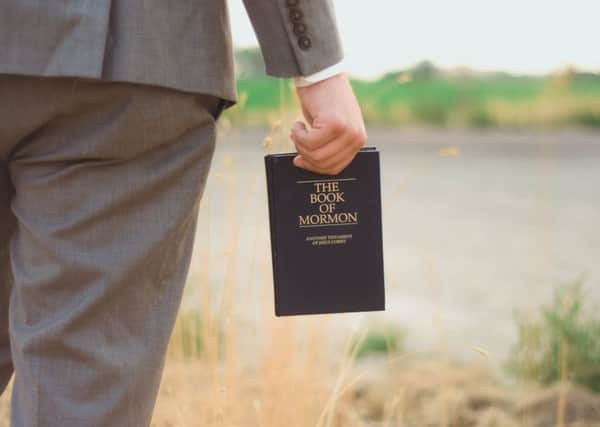My faith makes me no less Scottish - Stephen Kerr MP


My Christian faith has always been the significant part of my life. I was born into a family who were members of the Church of Jesus Christ of Latter-day Saints; in fact, it was my Welsh great-grandmother on my mother’s side who first converted nearly 120 years ago. Growing up in Forfar, it was never immediately obvious to me that I was a member of a religious minority. I didn’t feel particularly unusual, nor was I picked on or made to feel different at school.
From a young age, inspired by the example of the Mormon missionaries I met in Forfar, I felt a strong calling to serve as a mission for the Church and I was focused on this to the extent that I left school early to work and save money to put towards my much-anticipated two-year mission. I was assigned by the Church to go to London, a bit of a culture shock for a Forfar boy in the 1970s. Back in the day when young Latter-day Saints were serving a mission, we kept in touch with home and family through a weekly exchange of letters. Now it’s weekly Skype calls. As missionaries, we dedicated ourselves to sharing the gospel message with anyone who was kind enough to talk to us and it was a life experience more valuable than I can fully describe; I loved it.
Advertisement
Hide AdAdvertisement
Hide AdThroughout my student life, subsequent business career and more recently as a politician, my faith has been the bedrock of my life, as it is for many hundreds of thousands of other Scots who try each day to follow their faith. Differences such as the fact that Mormons don’t drink alcohol, tea or coffee seemed to me like mild curiosities rather than significant differences.
I can’t say that I had ever felt or been made to feel like a member of a religious minority, although the numbers show that quite clearly I am.
There’s something in the region of 20,000 Latter-day Saints in Scotland today and ten times that number across the United Kingdom. This is, according to the Census, double the number of members of the Free Church of Scotland and a third of all those identifying as Muslim.
I readily acknowledge the experiences I had growing up in the faith and as part of a Latter-day Saint family may be different from those who convert later to the Church. At first, converts may face varying degrees of opposition from family and friends, usually based on misunderstanding, but over time things sort themselves out. Having been rightly concerned for their loved ones, once reassured, they often provide positive and loyal support.
I am, by no means, the first Mormon in politics in Scotland. Brian Adam, who was a much admired and respected SNP MSP until his death in 2013, was a Latter-day Saint, and there are councillors and candidates from all parties who have been members of the Church.
There is no inherent viewpoint within the Church that would make a Mormon more socialist, conservative, nationalist or unionist – in the same way that there are members of the Church of Scotland serving in all the political parties.
In my time as an MP my faith has sometimes been traduced and inappropriately referenced for political purposes. Had such comments been made about Islamic or Roman Catholic beliefs, they would immediately have been deemed unacceptable.
Why should my religion, or any minority faith, be subject to a different standard of what is deemed an acceptable comment? How is it that any minority faith group can become fair game and have to put up with this?
Advertisement
Hide AdAdvertisement
Hide AdSometimes it does come down to a genuine lack of understanding of the faith, but in other instances it is blind prejudice, something which all people of faith may encounter from time to time.
However, there are also far too many cases when there is a deliberate attempt to misrepresent people of faith to undermine a person’s personal integrity for political purposes. I am sad to reflect that this has sometimes been my own experience.
The impact of these ill-informed and deliberate attacks on a personal level can, of course, be hurtful. However, I see them for what they are: a device to attack me politically.
My concern is that there is a wider impact on reputation and standing of the Church of Jesus Christ of Latter-day Saints and its members in Scotland. Members of the Church see that these attacks go unchallenged and that their faith can appear to be so openly mocked. They worry that this could happen to them and their families in their workplace, their community or in their children’s schools. This is intimidating and a source of understandable anxiety.
My experience of being a member of the Church of Jesus Christ of Latter-day Saints has never been one which has made me feel any less Scottish. I belong to a church founded in another country, as most of the faiths in Scotland are, but it has never felt foreign or different to me. My faith makes me no less Scottish, in the same way that my Conservatism or my Unionism, despite what some may say, make me no less a fiercely proud Scot and someone who cares passionately about this great country and its future.
Stephen Kerr is the Conservative MP for Stirling